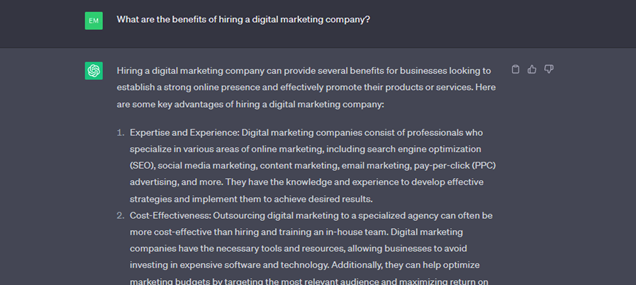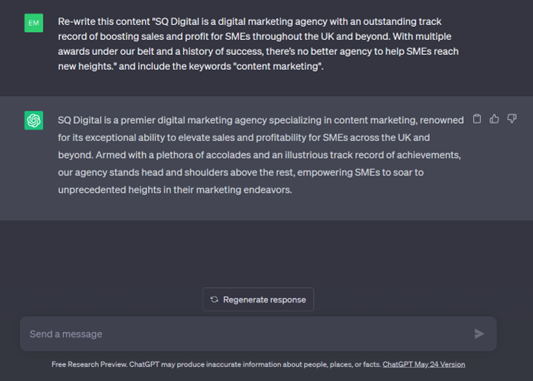
Imagine a world where marketing campaigns are crafted with lightning speed, hyper-personalised content, and unparalleled efficiency. Welcome to the era of AI-driven marketing! Artificial intelligence has swept through the marketing industry like a tidal wave, transforming how we create, strategise, and engage with our audiences.
As the line between human creativity and machine learning blurs, marketers are left to navigate uncharted waters, embracing the power of AI while grappling with its ethical implications. As the leaders in content marketing in the UK, we dive into this thrilling exploration of how AI has shaken the marketing landscape to its core and discover how you can harness its potential to propel your brand to new heights.
The Rise of Chat GPT
ChatGPT, part of the generative pre-trained transformer (GPT) family, is an AI-driven chatbot designed for engaging, human-like conversations. Built on the GPT-3.5 model, it has sparked diverse opinions in the marketing world. Using the platform, you can instantly access a wealth of information within minutes, even instructing it to create content, anything from web copy to stories and songs. Since its release, it has generated many heated discussions and debates over the morality of this kind of capability.
Some professionals see AI as a game-changer, streamlining content creation and boosting marketing strategies without spending hours writing content. However, others worry about potential downsides like job loss and AI-generated content blurring the line with human work.
While ChatGPT and other AI content-generating platforms excel at producing mass content with ease, it is certainly a long way from replacing the human element that an experienced content writer can produce. As AI continues to impact marketing, it is crucial to balance embracing its potential and addressing the challenges.
Can AI Be Trusted to Write Content?
Generative AI platforms such as ChatGPT can create content in seconds, which can then be used to bulk out websites, generate blog posts and even take the hassle away of creating social media posts. However, solely relying on these platforms is risky, particularly for businesses wishing to produce quality content for their online platforms.
AI has its flaws, like any new program. The technology is still in its infancy and, as such, can produce some very poor content. Whilst the latest versions have access to the internet for collecting their information, this doesn't mean that it is factually correct. If AI can't find the information you've asked for or might otherwise be useful in creating content, it may make up something new.
For example, there has been a recent case in the US where a law firm relied on ChatGPT for legal research, and when the cases it produced were fact-checked, it was found that they did not exist. Stories like this are popping up worldwide and have even encouraged some governments to ban this kind of technology until it has been developed to ensure it is a helpful tool, not a misleading font of information.
AI as a Research Tool
Although the article on the lawyer may put you off relying on AI for research, as long as you check the information it provides, it is a useful tool for online searching. Many copywriting AI platforms, particularly those with ChatGPT-4 as their data source, will provide the references to check within its answers. However, if you are using the free online version of ChatGPT, its information is limited to resources up to 2021, which means your information could be outdated.
That being said, nothing is stopping you from saving time on online research. For example, if you are writing about the advantages of a product, it will provide a full list of how a particular item or service will assist in consumers' day-to-day lives. This information can quickly be re-formatted and rewritten to provide a blog about said product. Bear in mind, when it comes to lists of advantages, ChatGPT online can be quite repetitive, so it will take the creativity of an experienced copywriter to take the information and provide a better in-depth view of the topic.
AI to Repurpose Content
For anyone who understands how important SEO services are for websites, you may be looking to refresh or repurpose content to include updated keywords or optimise better for those all-important rankings. This can be a time-consuming chore. However, this time can be significantly reduced with the help of AI. You can break down your content by paragraph and feed it through AI to rewrite the paragraph you have already written and include particular keywords you aim to hit with your content.
Again, much like any aspect of AI written content, it must be assessed that it makes grammatical sense. For example, if your keyword phrase is "Content Writing Lancaster", there are some grammatical errors which, if input directly into content, may make no sense.
Of course, there is a context issue which also comes with AI. Whilst your keyword may suit your business and the search volume of your clients, it could mean something completely different to someone else and AI. This could change the tone and meaning of your written content. For this reason, you must have an expert writer's eye over any AI-assisted content, especially if it has been written for the purpose of assisting with your website's SEO.
Lack of Context
One of the biggest issues faced by AI is its inability to address the bigger picture of the context you are aiming for it to write. We recently discovered this with a client whose keywords search term is "Cheap TVs.". Our client optimises for this term due to selling high-quality reconditioned TVs which offer some of the latest technology, so when optimising for the term "Cheap TVs", as part of their digital marketing strategy, we aimed to promote the purchase of their cheaper alternatives to larger retail stores. However, when using the term in AI generative content, it warned readers of the negatives of cheap TVs.
This example demonstrates the lack of context AI has when generating content. A better approach to AI generative content is to “teach” it what you want the outcome of your content to be. This is done using a collection of positive and negative keywords you want the AI to use when creating its output. For example, if we want AI to write about cheap TVs but remain within the context of our client's business model, we would have added "high-quality" into the mix. This will assist in directing AI where you would like context to go. However, striking the right balance of instruction and context can be challenging. It can often take time to establish how AI understands syntax to teach it to write in your desired style successfully.
Isn't AI-Assisted Copy Cheating?
In a world where technology is making life much easier, there is pretty much a tool for any job to streamline processes. Email has become the quickest way to contact worldwide. Many businesses even turned to Zoom and Teams Video conferencing throughout the pandemic to conduct business more efficiently and effectively when face-to-face contact was inaccessible. AI-assisted copywriting is a tool to make it a little bit easier.
AI misses many elements of human creativity, such as empathy and context. Although AI can help with the technical aspects of writing, it cannot replace the creativity that makes a great copy so effective. So whether it's hitting the right tone of your content, or appealing to a variety of audiences, although AI can assist, it doesn't quite hit the right elements that make copy inviting and engaging. What it does provide for content writing, however, is fewer "i"s to dot and fewer "t"s to cross (although there are a lot more "z"s to replace). It takes the mundane elements of creating copy and allows you to focus more energy on creating better-researched articles and more creative copy.
Get Only the Best for Your Website
We could cover so much with AI, but the platform's capabilities are just getting started. As time passes, we imagine it will give marketers an even more essential tool. Instead of seeing AI as a threat, treating it for what it is gives marketing agencies the step up in generating the best services for their client. At SQ Digital, we have integrated the efficiency of AI with the experience, knowledge, and empathy of our content team. This allows us to spend more time adding value to the writing and creating a more engaging copy.
Whilst we know that with the introduction of AI, businesses can now easily create their own copy, it will quickly become apparent just how repetitive AI is as a swarm of websites all start reading the same. So, whilst you could successfully use AI like ChatGPT to create a basic copy with a few keywords integrated, by using the likes of our digital marketing services in Lancashire, you can be sure that your copy offers something better; the efficiency of AI writing with the empathy and expertise of content writers which can give your brand a voice that stands out from the rest of the AI written websites.
Let us know if you can spot where AI has assisted this blog and which parts are written solely by our human content team.






